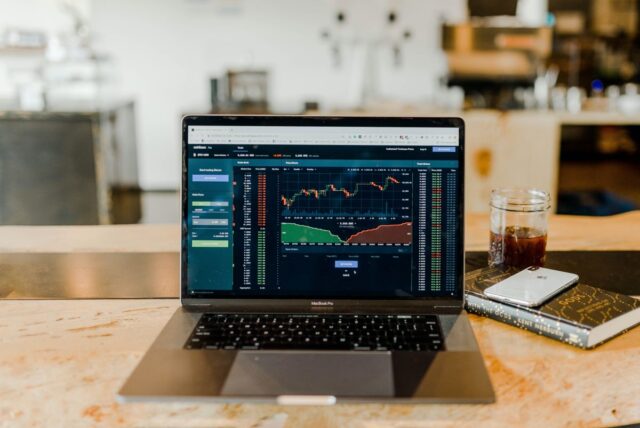
When it comes to traditional methods of raising funds, a lot of startups and small businesses face several operational hurdles. For example, regulatory requirements like adherence to stock exchanges’ rules and challenges in convincing private investors or banks to fund the project or idea. But with tokenization, business owners can offer equity shares as tokens on the blockchain. This method is considered low-cost compared to traditional initial public offering (IPO) and allows businesses to raise funds for assets in a more democratic way through the direct participation of all interested investors around the globe.
Although most people are familiar with so-called utility tokens like Ethereum, there are also security tokens that are less common. If you buy utility tokens on the crypto exchange like CEX.IO, then you may get access to special services available within the crypto network but these tokens do not give you a stake in the project.

Unlike utility tokens, security tokens represent the ownership of the specific asset or business equity. Such tokens serve similar purposes as stocks, so it’s no wonder why some companies use security tokens to tokenize their shares and other assets.
Let’s find out how they do it and what to expect with tokenized shares.
ETO/STO launch and preparations
There are different types of security tokens but if you want to add a dividend option, voting rights, or both, then you can use equity tokens. Raising funds for such assets is called security token offering (STO) or equity token offering (ETO) to be more specific.
One of the most important steps to prepare for STO is finding the right securities lawyer. A lawyer will be responsible for the proper disclosure of offering terms, collateral compliance, and different regulatory filings. Not all countries have a straightforward way to regulate tokenized assets like the Blockchain act in Lichtenstein, so an experienced lawyer can be crucial for successful fundraising. Otherwise, you may receive a subpoena from the regulator.

The next step is identifying which blockchain network to use to run your token. It can be an existing blockchain or your own network. The first option is considered as a more common and easier way to launch STO. Although Ethereum is known as the most popular network for launching equity tokens, a lot of companies switch to other smart contract platforms because they offer lower fees and faster transaction speed. For example, in April 2025, Dutch startup VMC announced the first STO on the Stellar network.
If you don’t have developers to create your own token, you can use the services of issuance platforms and token factories. The most well-known token factories within the security token space are Securitize, Polymath, and Harbor.
After completing necessary regulatory filings and developing a token, it’s time for fundraising and finding investors. For that, you can use different brokers, transfer agents, and money services, or list your token on the trading platform that supports security tokens.
Why are there not so many security tokens?

In 2018, the general crypto market, which is full of utility tokens, experienced a deep correction, and the crypto community rallied around security tokens. Venture capital also started supporting this rally, bringing liquidity to private markets. But adoption of security tokens is still considered slow.
The main reason is that security tokens are subject to greater regulatory scrutiny than utility tokens. Also, security tokens require approval from regulators to be traded on secondary exchanges or sold in public, especially to non-accredited investors. Besides, the majority of security offerings target U.S. investors, while the local regulator, Securities, and Exchange Commission (SEC), is known in the crypto industry to be quite conservative towards cryptocurrencies. But that’s all starting to change gradually.
In July 2019, the SEC set a precedent for the sale of tokens that can be immediately tradable to both accredited and non-accredited investors, qualifying a $23 million offering for Blockstack. The regulator also provided clarity around secondary sales.
In July 2025, Arca Labs issued its ArCoin digital security token, which represents shares in Arca’s U.S. Treasury Fund and is registered with the SEC.
In September 2025, there was the first-ever security token initial public offering that was qualified by the SEC. It was an $85 million STO from INX.
In April 2025, the SEC qualified a security token offering for Exodus that eventually helped the company raise $75 million from 6,800 individual investors. It was the first security token that conferred equity in the U.S.-based issuing company.

Even if these movements seem small for some people, it still shows that the crypto market evolves to complete regulatory compliance and it can bring massive mainstream adoption. Moreover, not only the U.S. regulator is getting softer towards cryptocurrencies. For example, Singapore-based bank DBS issued a security token offering and launched a digital exchange for tokenized assets that was greenlighted by the Monetary Authority of Singapore (MAS).
Although security tokens have experienced a lot of improvement in terms of regulatory clarity, it doesn’t mean that we will see the same hype for security tokens as for cryptocurrencies. These assets are different. A lot of investors love crypto for its volatility and opportunity to get 2x or even 100x profit in the short term. At the same time, security tokens usually do not offer prospects of huge returns but may provide relatively stable returns.
So security tokens can become an alternative option for businesses to find investors and fundraise the idea, not to get hyped on crypto. If the startup or business owner doesn’t have enough funds to comply with strict regulatory rules for a traditional stock offering, they may switch to a security token offering. They still need to comply with the rules and regulations but it can be a less expensive way for business and a more convenient way for retail investors.












